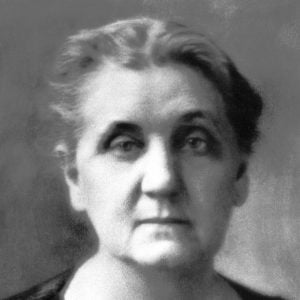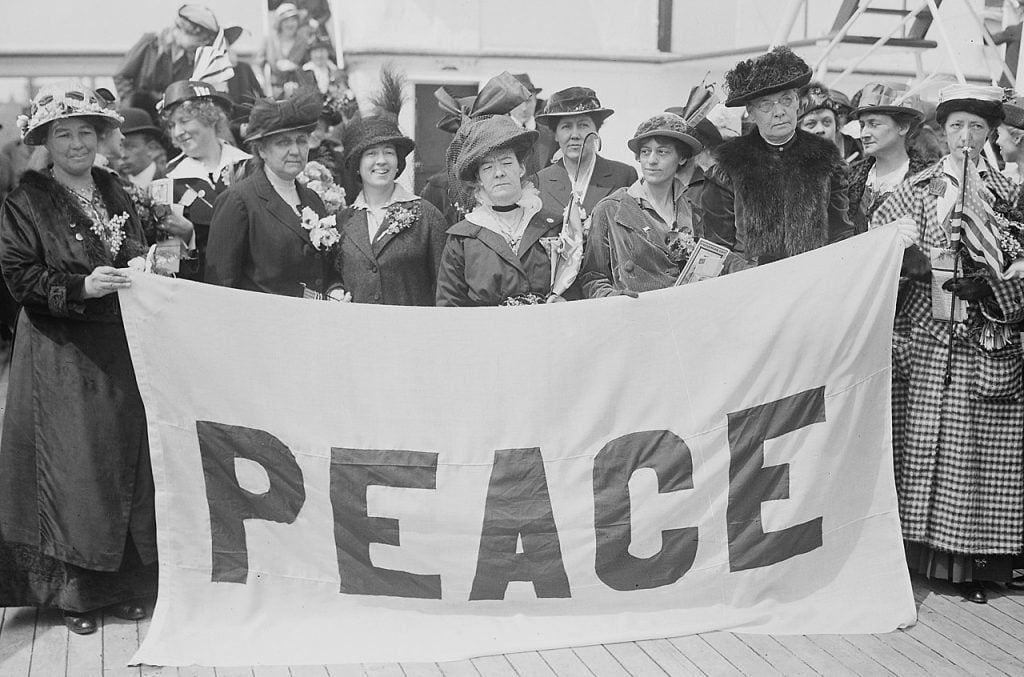Jane Addams
Speed read
Jane Addams was awarded the Nobel Peace Prize for her work to get the great powers to disarm and conclude peace agreements. She shared the prize with Nicholas Murray Butler.

Full name: Jane Addams
Born: 6 September 1860, Cedarville, IL, USA
Died: 21 May 1935, Chicago, IL, USA
Date awarded: 10 December 1931
Women’s international league for peace and freedom
Jane Addams was the second woman to be awarded the Nobel Peace Prize. In 1915 she founded the Women’s International League for Peace and Freedom, and she worked for many years to persuade the major powers to disarm and solve their disputes through peace treaties. During WWI, she headed the International Congress of Women in The Hague. When US President Woodrow Wilson led the country into war, Addams spoke out strongly against his decision. Due to her anti-war activities, she was accused of being unpatriotic and considered by many to be a threat to US security. Addams criticised the peace treaty forced on Germany in 1919, maintaining that it so humiliated Germany that a revanchist war could result. At the end of her life, Jane Addams was lauded by the US government for her peace efforts.
”Devotion to a cause always inspires respect, and in her devotion Miss Addams is truly American. This very year she joined with representatives all over the world to call for general disarmament.”
Halvdan Koht, Presentation Speech, 10 December 1931.
From traitor to heroine!
In 1915 Jane Addams founded the Women’s International League for Peace and Freedom, which cautioned against the harsh terms stipulated for Germany after WWI. She pointed out that the enormous war reparations demanded of Germany could destroy the country’s economy, fuelling hate and revanchist thinking among the German people. In the USA, the Women’s International League was at first chided for supporting revolution and communism. But as the 1920s progressed, Jane Addams regained her standing as an American heroine. One of those who nominated her for the Nobel Peace Prize was former President Woodrow Wilson.
Nominations for Janes Addams
”Probably no woman in our history ever worked harder or achieved more in social service and peace work than Jane Addams.”
The US newspaper The Evening Star, 21 December 1931.
Anti-imperialist
In 1898, the Spanish-American War broke out. The USA seized the Philippines, Hawaii and other islands in the Pacific Ocean, and took control of Puerto Rico and Cuba. Jane Addams belonged to the group of anti-imperialists in the US that criticised government war policy. The war led her to devote her efforts to the cause of peace. She gradually developed a pacifist philosophy, maintaining that conflicts between nations must be resolved by an international court.
”In the stir of the heroic moment when a nation enters war, men’s minds are driven back to the earliest obligations of patriotism …”
Jane Addams: “Patriotism and Pacifists in Wartime”, 1917.
Stop the war!
WWI came as a shock to Jane Addams. In 1915 she led the large, anti-war International Congress of Women in The Hague. After the conference, she and other delegates travelled to meet European heads of state in an effort to persuade them to take part in a peace conference. However, the women were not taken seriously in Europe. Addams then hoped that a neutral USA would act as mediator to achieve a ceasefire and negotiations. But President Woodrow Wilson was not willing to launch any peace initiatives. Much to Addams’ dismay, he steered the USA into the war in 1917.

A threat to the USA?
Jane Addams was greatly disturbed by the US entry into the war in 1917. Government propaganda labelled all opponents of the war as traitors, and many pacifists were jailed or interned. Addams was attacked in the press and placed under government surveillance. Many in the US peace movement distanced themselves from her, agreeing with President Wilson that the war was necessary to safeguard democracy. In the eyes of most, Jane Addams’ standing plummeted from being an admired peace advocate to being viewed a threat to the country.
Learn more
Jane Addams (born Laura Jane Addams) won worldwide recognition in the first third of the twentieth century as a pioneer social worker in America, as a feminist, and as an internationalist ...
Disclaimer: Every effort has been made by the publisher to credit organisations and individuals with regard to the supply of photographs. Please notify the publishers regarding corrections.
Nobel Prizes and laureates
Six prizes were awarded for achievements that have conferred the greatest benefit to humankind. The 14 laureates' work and discoveries range from quantum tunnelling to promoting democratic rights.
See them all presented here.
